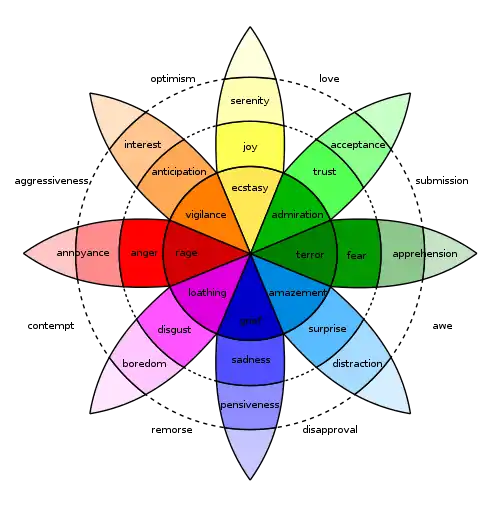Emotional well-being
Emotional well-being refers to the emotional quality an individual experiences.[1] Emotional well-being is influenced by a variety of demographic, economic, and situational factors. For example, the onset of the COVID-19 outbreak, lowered emotional well-being by 74%.[2] The implications of decreased emotional well-being are related to mental health concerns such as stress, depression, and anxiety. These in turn, contribute to physical health concerns such as digestive disorders, sleep disturbances, and general lack of energy.[3] The profile of a person prone to emotional distress is likely someone with low self-esteem, pessimistic, emotionally sensitive, very self-critical…, people who need to constantly assert themselves through their emotions. They also tend to be timid, overly worried about the future, and focused on the past. As Dr. Marisa Navarro says in her book La Medicina Emocional (Emotional Medicine), "no one is safe from suffering this emotional state. It is a very serious problem that can result in constant states of anger, sadness, worry and even anxiety or depression[4]".
On the positive side, enhanced emotional well-being is seen to contribute to upward spirals in increasing coping ability,[5] self-esteem, performance and productivity at work, and even longevity.[6] Thoughts determine our feelings, and thoughts are nothing more than firings of neurons. And those feelings that our thoughts generate make our body release extremely addicting substances like adrenaline and cortisol. Like with any other addiction, the need to continually feed off these addicting substances tends to make the body think and feel in a certain way. When someone decides to disengage from these emotional addictions, they have to learn to think differently.[7]
The connection between the mind and the body is so strong that mental and physical states feed into each other in both a positive and negative way. Feelings depend on thoughts and both determine attitudes and actions. This is the first thing that children would have to learn at a young age in order to learn that they can take the reins of their lives. And their feelings would not depend on what is happening around them, but rather their interpretation about what is happening.[8]
Emotional well-being is also one of two aspects of personal well-being that can be measured in quantitative quality of life assessments, the other being 'life evaluation', the evaluation of one's life in general against a scale.[9] It is a term receiving attention from many groups, from new-age therapists to management consultants, from outdoor recreation enthusiasts to carers for the elderly. It is also of interest to many parents, youth workers, school teachers, anti-bullying campaigners and those thinking about retirement, as well as to psychologists and other health professionals.
Good emotional health leads to better physical health, prevents diseases, and makes it possible to enjoy life and be happier. In this way one can become a "medicine person" through mirror neurons, those that lead to empathy and fire to imitate the emotions of others. Mirror neurons are what make people feel good when they are with someone who is positive, cheerful and motivational. At the other extreme are the so-called "toxic people", who make others around them feel bad.[10]
The Surgeon General of the United States has made emotional well-being one of his priorities [11] and spoke about its importance at the Aspen Ideas Festival 2016.[12]
Physicians must take a holistic approach to patients by caring for physical, psychological, and social health. To that end, they need to become aware of the importance of emotional medicine in order to help their patients decrease and manage negative feelings that can damage their health and teach them to enhance the positive feelings that can prevent and help heal illness.
See also
References
- Kahneman, Daniel; Deaton, Angus (2010-09-21). "High income improves evaluation of life but not emotional well-being". Proceedings of the National Academy of Sciences. 107 (38): 16489–16493. doi:10.1073/pnas.1011492107. ISSN 0027-8424. PMID 20823223.
- Yang, Haiyang; Ma, Jingjing (2020-07-01). "How an Epidemic Outbreak Impacts Happiness: Factors that Worsen (vs. Protect) Emotional Well-being during the Coronavirus Pandemic". Psychiatry Research. 289: 113045. doi:10.1016/j.psychres.2020.113045. ISSN 0165-1781.
- "Emotional Well Being & Mental Health". Harvard Health Publications: Harvard medical School. Harvard University. Retrieved 16 December 2010.
- La Medicina Emocional (Emotional Medicine).
- Fredrickson, Barbara L; Thomas Joiner (March 2002). "Positive Emotions Trigger Upward Spirals Toward Emotional Well-Being". Psychological Science. 13 (2): 172–175. doi:10.1111/1467-9280.00431. PMID 11934003.
- "Tis more blessed to give than to receive? Groundbreaking new outcomes research altruistic emotions and helping behavior". EMPOWERING CAREGIVERS. Retrieved 16 December 2010.
- "News 3 Edad".
- "Ser Padres (Bullying)".
- Kahneman, Daniel; Angus Deaton (September 2010). "High income improves evaluation of life but not emotional well-being". PNAS. 107 (38): 16489–16493. Bibcode:2010PNAS..10716489K. doi:10.1073/pnas.1011492107. PMC 2944762. PMID 20823223.
- "Infosalus (Toxic Person)". 2016-05-07.
- "The Surgeon General's Priorities". 2012-02-27.
- "Surgeon General Vivek Murthy on the importance of emotional well-being".

